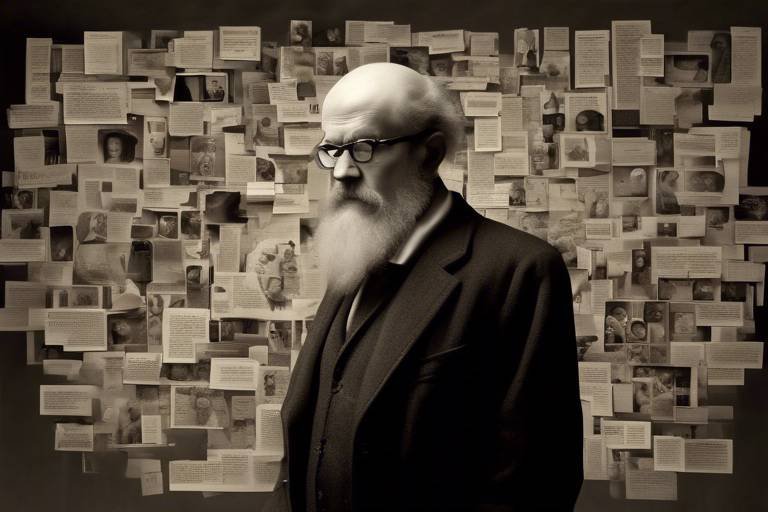Metaphysics - Uncovering the Invisible World
Have you ever pondered the nature of reality? What lies beyond what we can see and touch? Metaphysics invites us to explore these profound questions, delving deep into the essence of existence itself. This branch of philosophy goes beyond the tangible, challenging us to think about what is truly real and how our understanding of the universe is shaped by forces we cannot always observe. It’s like peering through a foggy window, trying to grasp the world on the other side—what you see is just a glimpse, but the potential for understanding is vast.
At its core, metaphysics seeks to answer questions about being, existence, and the universe. It compels us to ask: What does it mean to exist? How do we categorize and understand the different forms of existence? In a world dominated by scientific inquiry and empirical evidence, metaphysics stands as a testament to the human quest for deeper knowledge, urging us to explore the invisible threads that weave the fabric of reality.
As we navigate the complexities of metaphysics, we uncover layers of thought that have evolved over centuries. From the ancient musings of philosophers like Aristotle and Plato to modern existentialists, this field has been shaped by countless minds, each contributing to our understanding of the universe. It’s fascinating to think that while science explains the how of the universe, metaphysics seeks to uncover the why.
In this exploration, we will also encounter key concepts such as ontology, the study of being; epistemology, the study of knowledge; and cosmology, the study of the universe. These ideas serve as the backbone of metaphysical inquiry, guiding us through the labyrinth of existence. Just as a map helps us navigate unfamiliar terrain, understanding these concepts allows us to traverse the complex landscape of metaphysical thought.
Ultimately, metaphysics is not just an abstract field of study; it resonates deeply with our everyday lives. It challenges us to reflect on our beliefs, our perceptions, and the very nature of reality itself. As we embark on this journey to uncover the invisible world, we invite you to question, explore, and engage with the ideas that have shaped human thought for millennia. Are you ready to dive into the depths of existence?
- What is the main focus of metaphysics? Metaphysics primarily focuses on the nature of reality, existence, and the universe, exploring concepts that go beyond the physical world.
- Who are the key figures in the history of metaphysics? Notable figures include Aristotle, Plato, Immanuel Kant, and more contemporary philosophers who have contributed to the discourse.
- How does metaphysics relate to science? Metaphysics and science are intertwined; while science seeks to explain the workings of the universe, metaphysics questions the underlying principles that govern those workings.
- Can metaphysical concepts be proven? Many metaphysical ideas are abstract and not easily testable, leading to ongoing debates about the nature of reality and existence.

What is Metaphysics?
Metaphysics is a fascinating branch of philosophy that dives deep into the fundamental nature of reality. Think of it as the *underlying framework* that supports our understanding of everything around us. While science deals with the observable and measurable, metaphysics takes a step back to explore the *mysteries of existence*. It asks questions that go beyond the tangible, such as: What does it mean to exist? What is the nature of reality? And what lies beyond the physical world we can see and touch?
At its core, metaphysics seeks to uncover the essence of being and existence. It's like peeling back the layers of an onion; each layer reveals deeper insights into the universe and our place within it. This exploration often leads to discussions about concepts such as being, existence, time, space, and causality. These inquiries are not just abstract; they have profound implications for how we understand ourselves and the world around us.
To illustrate, consider the following key questions that metaphysics grapples with:
- What is the nature of objects? Are they merely physical entities, or do they possess some deeper essence?
- What is the relationship between mind and matter? How do our thoughts and consciousness interact with the physical world?
- What is the nature of time? Is it linear, cyclical, or perhaps an illusion?
These questions may seem abstract, but they have real-world applications. For instance, understanding the nature of reality influences various fields, including science, religion, and even ethics. Metaphysics challenges us to think critically and deeply about our beliefs, pushing us to explore the *unseen forces* that shape our lives.
In summary, metaphysics is not just a dry academic subject; it's a vibrant field that invites us to ponder the *big questions of life*. Whether you're a philosopher, a scientist, or simply a curious individual, engaging with metaphysical concepts can enrich your understanding of reality and your place within it.

Historical Background
Metaphysics, as a field of study, has roots that stretch deep into the annals of human thought. Its origins can be traced back to ancient philosophers like Aristotle and Plato, who laid the groundwork for exploring the nature of reality beyond mere physicality. Aristotle, in particular, is often hailed as the father of metaphysics, with his writings influencing countless generations of thinkers. His work, Metaphysics, is a cornerstone text that continues to shape our understanding of existence and the universe.
During the Classical Era, metaphysical inquiries were primarily concerned with questions of being and existence. Philosophers sought to understand the essence of things, asking profound questions such as, "What is real?" and "What is the nature of existence?" This period was characterized by a quest for knowledge that transcended the observable world, pushing the boundaries of human understanding.
As we moved into the Medieval Period, metaphysical thought began to intertwine with theology, particularly within the context of Christianity. Thinkers like Thomas Aquinas synthesized Aristotelian philosophy with religious doctrine, arguing for the existence of God through metaphysical reasoning. This blend of philosophy and theology marked a significant evolution in metaphysical thought, emphasizing the importance of divine existence in understanding the universe.
The Renaissance sparked a revival of interest in classical philosophy, leading to a re-examination of metaphysical concepts. Thinkers such as Descartes and Spinoza introduced new ideas about the nature of reality, consciousness, and existence, often challenging traditional views. Descartes famously declared, "I think, therefore I am," highlighting the role of thought in establishing existence. This period laid the groundwork for modern metaphysical discussions, as philosophers began to address the implications of human perception and knowledge.
In the 18th and 19th centuries, metaphysics faced criticism from empiricists and rationalists, leading to a more rigorous examination of its principles. Kant, for instance, argued that while metaphysical questions are essential, they must be approached with caution, as our understanding is limited by our sensory experiences. This tension between metaphysical inquiry and scientific reasoning gave rise to new philosophical movements, including idealism and existentialism.
Today, metaphysics continues to evolve, with contemporary philosophers engaging in debates that reflect the complexities of our modern world. The dialogue surrounding metaphysical concepts is vibrant, as thinkers grapple with issues such as the nature of reality, the existence of universals, and the relationship between mind and matter. This ongoing exploration showcases the profound significance of metaphysics in shaping our understanding of the universe and our place within it.
In summary, the historical background of metaphysics reveals a rich tapestry of thought that has evolved over centuries. From its ancient roots to contemporary debates, metaphysical inquiry remains a vital part of philosophical discourse, challenging us to ponder the deeper questions of existence.
- What is the main focus of metaphysics? Metaphysics primarily examines the fundamental nature of reality, including concepts of being, existence, and the universe.
- Who are the key figures in the history of metaphysics? Key figures include Aristotle, Plato, Thomas Aquinas, René Descartes, and Immanuel Kant, among others.
- How does metaphysics relate to other disciplines? Metaphysics intersects with various fields, including science, theology, and epistemology, influencing how we understand knowledge and existence.

Aristotle's Contributions
When we dive into the vast ocean of metaphysical thought, we can't help but notice the towering figure of Aristotle standing at its shore, casting a long shadow over the landscape of philosophy. His contributions are not just ripples; they are profound waves that have shaped our understanding of reality in ways that still resonate today. Aristotle, a student of Plato, took the philosophical torch and illuminated the path of inquiry with his unique perspectives on substance, causality, and potentiality.
One of Aristotle's most significant contributions is his exploration of the concept of substance. He proposed that everything in existence is made up of substances, which are the fundamental entities that make up reality. To Aristotle, a substance is not just a physical object; it encompasses both the material and the essence of a thing. This distinction between substance and essence is crucial for understanding metaphysical concepts. For instance, when we think about a tree, its substance is the physical tree itself, while its essence could be its 'treeness'—the qualities that make it what it is. This idea helps us grasp the deeper layers of reality, prompting us to ask, "What truly defines the things around us?"
Another cornerstone of Aristotle's metaphysical framework is the distinction between potentiality and actuality. These concepts are pivotal in understanding change and existence. Potentiality refers to the inherent capacity of a substance to develop into something else or to realize its possibilities. For example, consider a seed: it has the potential to become a large tree, but it needs the right conditions to actualize that potential. Actuality, on the other hand, is when that potential is realized. This dynamic interplay between potentiality and actuality invites us to ponder the nature of change in our own lives. Are we merely existing in a state of potential, or are we actively pursuing our actualization?
Aristotle's influence extends beyond these concepts; his method of inquiry laid the groundwork for future philosophical exploration. He emphasized the importance of empirical observation and logical reasoning, encouraging thinkers to base their conclusions on evidence rather than mere speculation. This approach not only revolutionized metaphysics but also paved the way for the development of the scientific method. Aristotle's insistence on examining the world around us has inspired countless generations to seek knowledge through observation and reason.
In summary, Aristotle's contributions to metaphysics are monumental. He provided the tools and frameworks that allow us to dissect reality and explore the essence of existence. His ideas about substance, essence, potentiality, and actuality continue to be pivotal in philosophical discourse, urging us to question and understand the world on a deeper level. As we navigate through the complexities of existence, Aristotle's insights serve as a guiding light, reminding us of the profound mysteries that lie beneath the surface of our everyday experiences.
- What is the significance of Aristotle's concept of substance?
Aristotle's concept of substance is significant because it helps us understand the fundamental nature of reality. It distinguishes between what things are made of and what they essentially are, providing a framework for exploring existence.
- How do potentiality and actuality relate to change?
Potentiality refers to the capacity for change, while actuality is the realization of that change. Understanding this relationship allows us to grasp how entities evolve and develop over time.
- Why is Aristotle considered a foundational figure in philosophy?
Aristotle is considered foundational because his ideas and methods laid the groundwork for many branches of philosophy, including metaphysics, ethics, and science, influencing countless thinkers throughout history.

Substance and Essence
When we dive into the depths of metaphysics, we encounter two pivotal concepts: substance and essence. These ideas are not just philosophical jargon; they are fundamental to our understanding of reality itself. So, what exactly do we mean by substance and essence? Let's break it down.
Substance refers to what something is fundamentally made of. Think of it as the "stuff" that constitutes a thing. For instance, when we talk about a wooden table, we recognize that its substance is wood. But, in the metaphysical sense, substance transcends mere physicality. It is what gives an object its identity and durability over time. Aristotle posited that substances are individual entities that exist independently, which means they have their own unique properties. In contrast, essence pertains to the intrinsic nature or indispensable quality of something that determines its character. In simpler terms, essence answers the question: "What is it?"
To illustrate this further, consider the example of a chair. The substance of the chair might be wood or plastic, but its essence is what makes it a chair—a seat with a back, designed for sitting. If we were to strip away its substance, what remains? The essence is what separates a chair from, say, a table or a sofa. This distinction is crucial in metaphysical discussions because it allows us to explore how different entities relate to one another and to the world around them.
Aristotle's exploration of these concepts laid the groundwork for centuries of philosophical inquiry. He argued that understanding the essence of things is essential for grasping their purpose and function in the universe. In this way, substance and essence are intertwined, as the former provides the material basis while the latter offers the defining characteristics.
In contemporary discussions, these concepts have evolved, yet they remain vital in debates about identity, change, and existence. For example, consider the famous thought experiment of the Ship of Theseus: if you replace all the parts of a ship one by one, is it still the same ship? This question challenges our notions of substance and essence, forcing us to reconsider what it means for something to retain its identity over time.
In summary, grasping the difference between substance and essence not only enriches our understanding of metaphysics but also enhances our comprehension of the world we inhabit. By recognizing the interplay between what things are made of and what they fundamentally are, we can navigate the complexities of existence with greater clarity.
- What is the difference between substance and essence? Substance refers to the physical material that makes up an object, while essence is the intrinsic nature that defines what that object is.
- Why are substance and essence important in metaphysics? They help us understand the identity and nature of objects, allowing us to explore deeper philosophical questions about existence.
- How do these concepts apply to modern philosophical debates? They are central to discussions about identity, change, and the nature of reality, influencing various fields including science and theology.

Potentiality and Actuality
The concepts of potentiality and actuality are pivotal in understanding Aristotle's metaphysical framework. Imagine a seed buried in the soil; it holds the potential to become a towering tree. This potentiality is not just a dream; it is a real capacity waiting for the right conditions to be realized. In Aristotle's view, potentiality refers to the inherent abilities or possibilities that a thing possesses, while actuality is the fulfillment of that potential. It's like the difference between a musician who has the potential to compose a symphony and the moment they finally perform it. This transformation from potential to actual is fundamental to understanding change and existence.
To further clarify, let's break down these concepts:
| Concept | Description |
|---|---|
| Potentiality | The capacity of a being to develop into a certain state or to perform certain actions. It is about what could be. |
| Actuality | The realization or manifestation of potential. It is about what is. |
This distinction is not just academic; it has profound implications for how we perceive change in our world. For instance, consider a caterpillar transforming into a butterfly. The caterpillar has the potentiality to become a butterfly, but it only becomes actual when it undergoes metamorphosis. This process of change is not merely a physical transformation; it symbolizes growth and the realization of one's true nature. Aristotle believed that understanding this transition helps us grasp the essence of existence itself.
Moreover, these concepts help us navigate various philosophical discussions. When we talk about the universe, for example, we can ponder whether it exists in a state of potentiality, always on the brink of becoming something more, or if it has reached a state of actuality. This leads us to ask deeper questions: Is the universe static, or is it in a constant state of flux? Does everything around us merely exist in potential, waiting for the right moment to manifest? These inquiries illuminate the dynamic nature of reality as we perceive it.
In conclusion, understanding potentiality and actuality is like unlocking a door to a deeper comprehension of existence. It encourages us to reflect on our own lives and the potential we each hold. Are we merely existing, or are we actively pursuing our potential? These questions resonate not just in philosophy but in our daily lives, urging us to strive for our actualization.
- What is the difference between potentiality and actuality? Potentiality refers to the inherent capabilities of something, while actuality is the realization of those capabilities.
- How do these concepts apply to everyday life? They encourage us to reflect on our own potential and the actions we take to actualize it.
- Why are potentiality and actuality important in metaphysics? They help us understand change, existence, and the nature of reality itself.

Modern Metaphysical Thought
Modern metaphysical thought has taken the rich tapestry of classical ideas and woven them into a contemporary framework that reflects our current understanding of the universe. It's like taking an ancient map and updating it with new routes and landmarks, allowing us to navigate the complexities of existence with a fresh perspective. Philosophers today are not just content to ponder abstract concepts; they actively engage with the implications of modern science, existentialism, and even technology. This dynamic interplay has led to a vibrant discourse that continues to challenge and expand our understanding of reality.
One of the most significant shifts in modern metaphysics is the incorporation of scientific advancements. Think about it: just a few centuries ago, the universe was largely viewed through the lens of classical mechanics. Now, with the advent of quantum physics and the theory of relativity, our understanding of space, time, and matter has dramatically changed. This has prompted philosophers to reconsider age-old questions about existence and reality. For instance, how do quantum mechanics influence our understanding of causality? What does it mean for something to exist in a universe where particles can be in multiple states at once? These questions are not merely academic; they resonate deeply with our perception of reality.
Moreover, existentialism has profoundly influenced modern metaphysical discussions. Philosophers like Jean-Paul Sartre and Martin Heidegger have emphasized the importance of individual experience and subjective reality. They argue that existence precedes essence, meaning that individuals create their own values and meanings in a seemingly indifferent universe. This perspective shifts the focus from abstract metaphysical concepts to the lived experiences of individuals, challenging us to confront the essence of our existence. It raises questions like: What does it mean to be truly free? How do we navigate our existence in a world filled with uncertainty?
Another notable aspect of modern metaphysical thought is the debate between realism and anti-realism. Realists assert that the world exists independently of our perceptions, while anti-realists argue that our understanding of reality is shaped by our experiences and interpretations. This debate has significant implications for various fields, including science, ethics, and art. For example, in science, if we adopt a realist perspective, we might view scientific theories as accurate representations of reality. Conversely, an anti-realist stance could lead us to question the objectivity of scientific knowledge itself. This ongoing conversation is crucial as it influences how we approach knowledge and truth in an age where information is abundant yet often contested.
In summary, modern metaphysical thought is a rich and evolving field that reflects our changing understanding of existence. By engaging with contemporary scientific discoveries and philosophical movements, it challenges us to reconsider our beliefs about reality. As we navigate through these complex ideas, we find ourselves at the intersection of philosophy, science, and personal experience, prompting us to ask deeper questions about what it truly means to exist in this ever-changing universe.
- What is the main focus of modern metaphysics? Modern metaphysics primarily focuses on understanding existence, reality, and the implications of scientific discoveries on these concepts.
- How does modern metaphysics differ from classical metaphysics? Unlike classical metaphysics, which often relied on abstract reasoning, modern metaphysics incorporates insights from science and emphasizes subjective experiences.
- What role does existentialism play in modern metaphysical thought? Existentialism emphasizes individual experience and the creation of meaning, influencing how we perceive reality and existence.
- What are the key debates in modern metaphysics? Key debates include realism vs. anti-realism and the implications of quantum mechanics for understanding causality and existence.

Key Concepts in Metaphysics
Metaphysics is a vast field that dives deep into the fundamental nature of reality, and within this realm, there are several key concepts that form the backbone of metaphysical inquiry. Understanding these concepts is essential for anyone looking to grasp the complexities of existence and our place within it. Among these concepts, ontology, epistemology, and cosmology stand out as pivotal areas of study.
Ontology is the study of being and existence. It asks profound questions such as: What does it mean to exist? What categories of being are there? In essence, ontology seeks to delineate the various kinds of entities that populate our reality. For instance, it distinguishes between physical objects, abstract concepts, and even potential beings. The implications of these distinctions are profound, as they shape our understanding of everything from the nature of consciousness to the existence of universals.
Next, we have epistemology, which examines the nature and scope of knowledge. This branch of metaphysics asks questions like: How do we know what we know? What is the relationship between belief and truth? Epistemology is not just about acquiring knowledge; it also delves into the justification of beliefs and the limits of human understanding. This is crucial because our metaphysical assumptions often influence our epistemological inquiries. For example, if one believes in a materialistic view of the universe, it may limit the types of knowledge one considers valid.
Lastly, cosmology deals with the origins and structure of the universe. It explores questions about the nature of time, space, and the cosmos itself. Cosmology intersects with both science and philosophy, as it seeks to understand not just how the universe came into being, but also its ultimate fate. This aspect of metaphysics can sometimes feel like a cosmic puzzle, where each piece represents a theory or idea that attempts to explain the vastness of existence.
To further illustrate these concepts, let's take a look at the following table that summarizes the key elements of ontology, epistemology, and cosmology:
| Concept | Description | Key Questions |
|---|---|---|
| Ontology | The study of being and existence. | What exists? What categories of being are there? |
| Epistemology | The study of knowledge and belief. | How do we know what we know? What is truth? |
| Cosmology | The study of the universe's origins and structure. | What is the nature of time and space? How did the universe begin? |
These concepts are not just academic; they resonate deeply with our everyday experiences and thoughts. For instance, when we ponder the meaning of our lives or question the reality of our perceptions, we are engaging in metaphysical thought. Understanding ontology, epistemology, and cosmology can help us navigate these profound questions, offering insights that can illuminate our understanding of existence itself.
- What is the primary focus of metaphysics? Metaphysics primarily focuses on understanding the fundamental nature of reality, including concepts like existence, being, and the universe.
- How does ontology differ from epistemology? Ontology deals with the nature of being and existence, while epistemology concerns itself with the nature and scope of knowledge.
- Why is cosmology important in metaphysics? Cosmology helps us understand the origins and structure of the universe, bridging the gap between scientific inquiry and philosophical thought.

Ontology
Ontology, often considered the backbone of metaphysics, is the study of being and existence. It dives deep into the essence of what it means to exist, raising profound questions that challenge our understanding of reality. Think of ontology as the philosophical framework that helps us categorize everything in our universe, from tangible objects like trees and mountains to abstract concepts such as love and justice. It’s like trying to build a map of existence, where every entity, whether physical or conceptual, has its own designated spot.
At its core, ontology asks questions such as: What is existence? What does it mean to be? Are there different kinds of existence? These inquiries lead us to explore various ontological theories, each offering unique perspectives on the nature of reality. For example, some ontological views suggest that only physical objects exist, while others argue for the existence of abstract entities like numbers or moral values.
To illustrate the complexity of ontological thought, consider the following table, which outlines some key ontological theories:
| Ontology Theory | Description |
|---|---|
| Realism | Posits that objects exist independently of our perception of them. |
| Nominalism | Argues that abstract concepts do not exist independently but are merely names we use to describe groups of objects. |
| Idealism | Claims that reality is fundamentally mental, and that objects only exist as perceptions in the mind. |
| Existentialism | Focuses on individual existence, freedom, and choice, emphasizing the subjective experience of being. |
Each of these theories offers a distinct lens through which we can view the world, shaping our understanding of everything from the nature of objects to the complexities of human experience. For instance, realism might lead us to believe in a world that exists outside of our thoughts, while idealism could suggest that our perceptions shape reality itself.
Moreover, ontology is not just an abstract pursuit; it has practical implications in various fields such as science, theology, and even artificial intelligence. In science, for example, ontological assumptions inform how we categorize phenomena and develop theories. In AI, understanding what it means for something to "exist" can influence how machines interpret and interact with the world around them.
In conclusion, ontology serves as a crucial component of metaphysical inquiry, inviting us to ponder the very nature of existence. By engaging with ontological questions, we not only deepen our philosophical understanding but also enrich our appreciation for the complexities of life itself.
- What is ontology? Ontology is the branch of metaphysics that studies the nature of being, existence, and reality.
- Why is ontology important? It helps us understand the fundamental categories of existence and the relationships between different entities.
- How does ontology relate to other disciplines? Ontological concepts influence fields like science, theology, and artificial intelligence by shaping how we categorize and understand various phenomena.

Epistemology
Epistemology, a fascinating branch of philosophy, delves into the nature and scope of knowledge. It's like peering through a window into our understanding of what we know, how we know it, and the limits of that knowledge. Have you ever wondered about the certainty of your beliefs? Or questioned how you can be sure that what you perceive is real? These profound inquiries are at the heart of epistemological studies.
At its core, epistemology grapples with several pivotal questions: What is knowledge? How do we acquire it? And what justifies our beliefs? To navigate through these questions, epistemologists often categorize knowledge into different types, such as propositional knowledge, which is knowing that something is the case, and procedural knowledge, which is knowing how to do something. This distinction is crucial because it highlights that knowledge isn't just about facts; it's also about skills and competencies.
Moreover, epistemology introduces various theories regarding the sources of knowledge. Here are some of the key sources:
- Perception: The information we gather through our senses.
- Reason: The logical deductions we make based on existing knowledge.
- Introspection: The examination of our own thoughts and feelings.
- Testimony: Knowledge we gain from others, which can be both reliable and questionable.
One intriguing aspect of epistemology is the debate between empiricism and rationalism. Empiricists argue that knowledge comes primarily from sensory experience, while rationalists believe that reason and innate ideas are the foundations of knowledge. This clash is reminiscent of the age-old battle between two superheroes: the empirical detective, who trusts only what he can see, and the rationalist philosopher, who believes in the power of the mind to uncover truths beyond mere observation.
As we explore epistemology, we also encounter the concept of justification. Justification is what transforms a belief into knowledge. For instance, if you believe it will rain tomorrow, you need a good reason—like a weather forecast or dark clouds in the sky—to justify that belief. Without justification, your belief remains just that—a belief, not knowledge. This leads to the famous Gettier problem, which challenges the traditional definition of knowledge as "justified true belief." It shows that even justified beliefs can sometimes lead to false conclusions, prompting further investigation into the nature of knowledge.
In the modern context, epistemology intersects with various fields, including science, technology, and even artificial intelligence. As we navigate an era overflowing with information, understanding the principles of epistemology becomes crucial. It helps us discern credible sources from misinformation, guiding us in our quest for knowledge in an increasingly complex world. So, the next time you come across a claim or a piece of information, ask yourself: What justifies this knowledge? How do I know it’s true?
- What is the difference between knowledge and belief?
Knowledge is typically considered justified true belief, whereas belief can exist without justification or truth. - How does epistemology relate to science?
Epistemology helps us understand the foundations of scientific knowledge, including how hypotheses are formed, tested, and validated. - Can knowledge be absolute?
Many philosophers argue that knowledge is often provisional, subject to revision as new evidence emerges.

The Significance of Metaphysics
Metaphysics holds a profound significance in the realm of philosophy and beyond. It serves as the bedrock for many other disciplines, shaping our understanding of reality in ways that extend far beyond mere physical observations. When we ponder the fundamental questions of existence, purpose, and the nature of reality itself, we are engaging in metaphysical inquiry. This exploration is not just an abstract exercise; it has real-world implications that affect how we perceive our lives and the universe around us.
One of the most compelling aspects of metaphysics is its influence on various fields, including science, theology, and ethics. For instance, in science, metaphysical assumptions underpin the methodologies we use to explore the physical world. Scientists often operate under the belief that the universe is governed by consistent laws, a metaphysical stance that allows for the formation of hypotheses and theories. Without this foundational belief, the scientific method would lose its footing, rendering empirical inquiry futile.
Moreover, metaphysics invites us to grapple with existential questions that resonate deeply within human consciousness. Consider the following key areas where metaphysics plays a crucial role:
- Understanding Existence: Metaphysics challenges us to consider what it means to exist. Are we merely physical beings, or is there something more profound at play?
- Exploring Reality: It pushes the boundaries of our understanding, prompting questions about the nature of reality itself. Is reality objective, or is it shaped by our perceptions?
- Connecting Disciplines: Metaphysical inquiry often bridges gaps between disparate fields, fostering interdisciplinary dialogue that enriches our overall understanding.
In addition to these areas, metaphysics also has a significant impact on ethics and morality. By examining the nature of free will, consciousness, and the essence of good and evil, metaphysical discussions inform ethical frameworks that guide our decision-making processes. For example, if we believe in determinism, the implications for moral responsibility are profound. Conversely, if we uphold the notion of free will, we must grapple with the consequences of our choices.
Furthermore, metaphysics encourages a sense of wonder and curiosity about the universe. It inspires us to look beyond the surface of things and consider the deeper meanings that might lie beneath. This quest for understanding can lead to a more fulfilling and enriched life, as we seek to connect with the greater mysteries of existence.
In summary, the significance of metaphysics extends far beyond the confines of philosophy. It shapes our understanding of existence, influences scientific inquiry, informs ethical considerations, and fosters a sense of wonder about the universe. As we engage with metaphysical questions, we not only deepen our philosophical insight but also enrich our lives in meaningful ways.
- What is metaphysics? Metaphysics is a branch of philosophy that explores the fundamental nature of reality, including concepts of being, existence, and the universe.
- Why is metaphysics important? It shapes our understanding of existence and influences other disciplines, such as science and ethics, by providing a framework for exploring fundamental questions about reality.
- How does metaphysics relate to science? Metaphysical assumptions underpin scientific methodologies, allowing for the exploration of the physical world and the formulation of theories based on consistent laws.
- Can metaphysical questions be answered? While some questions may remain unanswered, engaging with them can lead to deeper insights and a richer understanding of our existence.

Contemporary Debates in Metaphysics
In the ever-evolving landscape of philosophy, have sparked intense discussions among scholars and thinkers. These debates delve into profound questions about the nature of reality, existence, and our understanding of the universe. One of the primary battlegrounds is the clash between realism and anti-realism. Realists assert that the world exists independently of our perceptions, while anti-realists argue that our understanding of reality is inherently shaped by our experiences and interpretations. This fundamental disagreement raises intriguing questions: Does the universe exist outside of our observations? Or is it merely a construct of our minds?
Another significant topic in contemporary metaphysics is the nature of time and space. Philosophers are divided on whether time is an absolute entity that flows independently of human consciousness or a relational concept that emerges from the interactions of events. This debate is not just academic; it has real implications for how we perceive our lives and the universe. For instance, if time is indeed an absolute entity, it may suggest a predetermined universe, whereas a relational view opens the door to the idea of free will and the fluidity of existence.
Moreover, discussions surrounding modal realism have gained traction in recent years. This theory posits that all possible worlds are as real as the actual world we inhabit. Imagine a universe where every decision you make spawns a new reality—this perspective challenges our conventional understanding of existence and invites us to consider the implications of our choices on a cosmic scale. It raises questions about identity and continuity: If there are infinite versions of ourselves, what does that mean for our sense of self?
In addition to these debates, the intersection of metaphysics with science has led to fascinating discussions about the nature of the universe. Quantum mechanics, for example, has challenged traditional metaphysical views by introducing concepts like superposition and entanglement, which defy classical notions of reality. Scientists and philosophers alike are grappling with the implications of these findings, questioning whether our metaphysical frameworks are adequate to explain the complexities of the quantum world.
To summarize, the contemporary debates in metaphysics are rich and multifaceted, touching upon fundamental questions that have intrigued humanity for centuries. They not only challenge our understanding of reality but also invite us to reflect on our place within the cosmos. As we continue to explore these profound issues, we find that metaphysics remains a vibrant and essential field of inquiry.
- What is the main focus of contemporary metaphysical debates?
Contemporary metaphysical debates primarily focus on issues like realism vs. anti-realism, the nature of time and space, and the implications of modal realism. - How does metaphysics relate to science?
Metaphysics and science are interconnected; metaphysical assumptions often underpin scientific theories, and scientific discoveries can challenge existing metaphysical views. - Why is the nature of time a significant topic in metaphysics?
The nature of time raises essential questions about existence, free will, and the structure of the universe, making it a central topic in metaphysical inquiry.

Metaphysics and Science
When we think about metaphysics and science, it might seem like we're talking about two entirely different worlds. However, these fields are deeply intertwined, each influencing the other in profound ways. At its core, metaphysics is concerned with the fundamental nature of reality, while science seeks to understand the physical universe through observation and experimentation. So, how do these two realms connect?
One of the primary ways metaphysics impacts science is through its foundational assumptions. For instance, when scientists conduct experiments, they operate under certain metaphysical beliefs about the nature of reality. Concepts like causality, the existence of an external world, and the uniformity of nature are all metaphysical postulates that science relies on. Without these assumptions, scientific inquiry would be nearly impossible. It’s like trying to build a house without a solid foundation; the entire structure would collapse.
Moreover, metaphysics raises questions that science often cannot answer. For example, while science can describe how the universe operates, it does not address why it exists in the first place. This is where metaphysical inquiry steps in, prompting us to ponder the ultimate reasons behind existence. It’s akin to asking, "What’s the point of it all?" These deeper questions can lead to rich discussions that bridge both fields, fostering a more comprehensive understanding of our reality.
As we delve deeper, we can see that metaphysical theories often provide the framework within which scientific theories are developed. Consider the debate surrounding quantum mechanics. The bizarre behavior of particles at the quantum level raises significant metaphysical questions about the nature of reality itself. For instance, does a particle exist in a definite state before it is observed, or is its state determined by the act of observation? These questions are not just scientific; they are profoundly metaphysical.
In addition, the relationship between metaphysics and science can be illustrated through a table that highlights key areas of interaction:
| Aspect | Metaphysics | Science |
|---|---|---|
| Nature of Reality | Explores existence beyond the physical | Studies observable phenomena |
| Assumptions | Assumes a consistent reality | Relies on empirical evidence |
| Questions | Asks "Why?" and "What is?" | Asks "How?" and "What happens?" |
| Examples | Existence of universals | Theories of gravity |
As we can see from the table, while metaphysics and science may approach reality from different angles, their interplay is crucial for a holistic understanding of existence. This relationship encourages a dialogue that can lead to new insights and discoveries.
In conclusion, the connection between metaphysics and science is not just a theoretical exercise; it has real implications for how we understand the world around us. As we continue to explore the mysteries of both fields, we may find that the answers to our most profound questions lie at the intersection of metaphysical inquiry and scientific investigation. So, the next time you ponder the nature of reality, remember that both metaphysics and science are essential players in this grand exploration.
- What is the role of metaphysics in scientific inquiry? Metaphysics provides foundational assumptions that guide scientific exploration and helps address questions that science alone cannot answer.
- Can science exist without metaphysical assumptions? No, science relies on various metaphysical beliefs, such as the existence of an external reality and the consistency of nature.
- How do metaphysical questions influence scientific theories? Metaphysical questions often prompt scientists to explore deeper issues, such as the nature of time, space, and existence itself.

Conclusion
In conclusion, metaphysics stands as a cornerstone of philosophical inquiry, inviting us to delve into the profound questions that shape our understanding of existence and reality. It encourages us to look beyond the surface of the physical world and explore the intricate web of concepts that govern our lives. Just as a painter uses various colors to create a masterpiece, metaphysics employs abstract ideas to help us comprehend the complexities of the universe.
This exploration is not merely academic; it resonates deeply in our everyday lives. The questions we ponder—about our existence, the nature of reality, and the universe—are all fundamentally metaphysical. They challenge us to think critically and expand our horizons. As we navigate through life, metaphysical insights can guide our understanding of ourselves and our place in the cosmos.
Moreover, the interplay between metaphysics and other disciplines, such as science and theology, enriches our comprehension of the world. By examining the underlying assumptions that shape our scientific theories or theological beliefs, we gain a more holistic view of reality. This cross-pollination of ideas fosters a deeper appreciation for the mysteries of existence.
As we continue to grapple with contemporary debates in metaphysics, such as the nature of time, space, and the essence of reality itself, we find ourselves at the forefront of a fascinating intellectual journey. This journey not only enriches our philosophical landscape but also invites us to question our own beliefs and assumptions.
In essence, metaphysics is not just an abstract field of study; it is a vital part of our quest for knowledge and understanding. It encourages us to ponder the big questions and seek answers that resonate with our human experience. As we close this exploration of metaphysics, let us carry forward the insights gained and remain open to the mysteries that lie ahead.
- What is metaphysics? Metaphysics is a branch of philosophy that studies the fundamental nature of reality, including concepts like being, existence, and the universe.
- Who are the key figures in metaphysics? Important figures include Aristotle, Plato, and modern philosophers who have expanded on classical ideas.
- Why is metaphysics important? It helps shape our understanding of existence and influences various fields such as science and theology.
- What are the main concepts in metaphysics? Key concepts include ontology (the study of being), epistemology (the study of knowledge), and cosmology (the study of the universe).
- How does metaphysics relate to science? Metaphysical assumptions often underpin scientific theories, providing a framework for understanding scientific discoveries.
Frequently Asked Questions
- What is metaphysics?
Metaphysics is a branch of philosophy that dives deep into the fundamental nature of reality. It explores concepts like being, existence, and the universe, aiming to uncover what lies beyond the physical realm. Think of it as the philosophy of everything that isn't easily seen or touched!
- Who were the key figures in the history of metaphysics?
Some of the most influential philosophers in the history of metaphysics include Aristotle and Plato. Their groundbreaking ideas set the stage for centuries of philosophical thought, shaping how we understand existence and reality today. It's like they laid the blueprint for all future metaphysical inquiry!
- What are the key concepts in metaphysics?
Key concepts in metaphysics include ontology (the study of being), epistemology (the study of knowledge), and cosmology (the study of the universe). Each of these areas helps us grasp the complexities of existence and our place in the grand scheme of things.
- How does metaphysics relate to science?
The relationship between metaphysics and science is intricate. While science focuses on empirical evidence and experimentation, metaphysics provides the underlying assumptions that shape scientific theories. It's like the foundation of a house; without it, the structure wouldn't stand!
- Why is metaphysics significant?
Metaphysics is significant because it influences not just philosophy but also fields like science and theology. It prompts us to question the nature of reality and our understanding of existence, ultimately enriching our intellectual pursuits and personal insights.
- What are some contemporary debates in metaphysics?
Contemporary debates in metaphysics often revolve around issues like realism vs. anti-realism and the nature of time and space. These discussions are crucial as they help refine our understanding of reality in light of new philosophical and scientific developments.



















